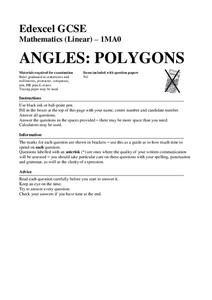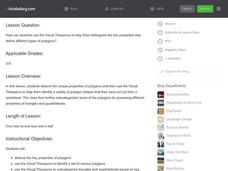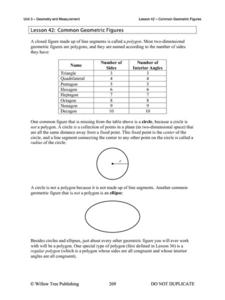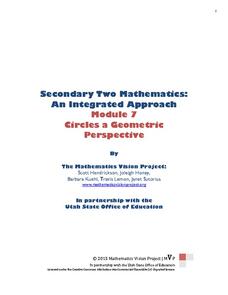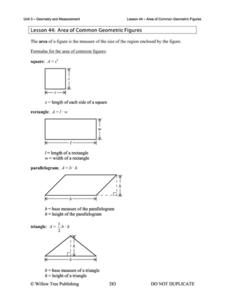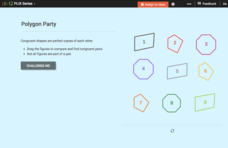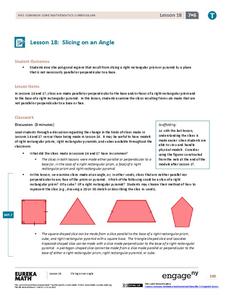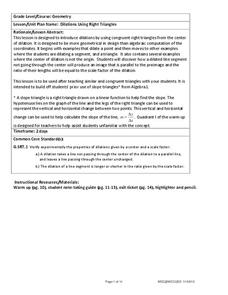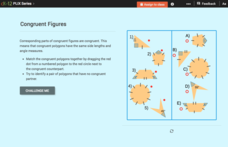Willow Tree
Interior Angles, Exterior Angles, and Diagonals of Polygons
How does the number of sides of a polygon affect the angle measures? Learners recognize a pattern in finding the total measure of interior and exterior angles and the number of diagonals. They use the patterns to calculate...
Illustrative Mathematics
Finding Areas of Polygons, Variation 1
An exercise in finding the area of polygons by decomposing into triangles and composing into rectangles is the focus of this resource. Make several copies of the worksheet for each participant. Ask learners to use colored pencils to...
Mathed Up!
Angles in Polygons
Show your class that finding angle measures is a regular calculation with a resource that provides 12 problems dealing with the measures of angles in regular polygons. Pupils use formulas for the sum of measures of angles in a polygon to...
K-5 Math Teaching Resources
Polygon Sort Sheet
What makes a polygon a polygon and how many different types are there? Invite your scholars to learn and discuss that question with this polygon sort sheet. Learners cut out each polygon and sort them by their different...
Curated OER
Know Your Polygons!
Students identify and categorize different polygons. In this polygons lesson plan, students research and identify properties of polygons, identify different polygon shapes, and categorize different triangles and quadrilaterals.
Arizona Department of Education
Area and Perimeter of Regular and Irregular Polygons
Extend young mathematicians' understanding of area with a geometry lesson on trapezoids. Building on their prior knowledge of rectangles and triangles, students learn how to calculate the area of trapezoids and other...
Illustrative Mathematics
Sum of Angles in a Polygon
How can learners use algebra to solve a geometry problem? Help learners create an equation that shows the relationship between the number of sides of a polygon and the sum of the interior angles. Young scholars are asked to divide the...
Mathed Up!
Frequency Polygons
Frequency polygons are a different way to represent frequencies over intervals. Pupils take frequencies for intervals of data from a frequency table and plot them as a frequency polygon. Budding mathematicians find information about the...
CK-12 Foundation
Polygon Classification
Polly want a polygon? Young mathematicians sort shapes using an interactive. They classify the shapes as convex polygons, concave polygons, or not polygons.
CK-12 Foundation
Regular and Irregular Polygons: Polygon States
Colorado would probably object if Wyoming enlarged its borders. Scholars use an interactive map to change the borders of U.S. states to see how angles change. They then answer questions about regular and irregular polygons.
Flipped Math
Unit 9 Review: Area of Polygons
It's time to show what you know! Individuals first review finding the area of polygons using the formulas from parallelograms to regular polygons. They then brush up on finding the area and circumference of circles, as well as reviewing...
CK-12 Foundation
Polygon Classification in the Coordinate Plane
Classify this resource into the "Use" pile. Scholars use an interactive coordinate plane to plot polygons given coordinates for the vertices. They use properties to classify each polygon and answer a few challenge questions regarding the...
Scholastic
Study Jams! Perimeter
Follow this engaging slide show on the calculation of polygon perimeter with some hands-on measurement of perimeters to solidify the concepts. On this webpage there are interactive assessment questions and links to related resources by...
Willow Tree
Common Geometric Figures
Geometry could be called the study of figures. An overview of the figures found in a typical geometry course contains a study of different triangles, quadrilaterals, and regular polygons.
Mathematics Vision Project
Circles: A Geometric Perspective
Circles are the foundation of many geometric concepts and extensions - a point that is thoroughly driven home in this extensive unit. Fundamental properties of circles are investigated (including sector area, angle measure, and...
Willow Tree
Area of Common Geometric Figures
Scholars can use area formulas, but can they apply what they know about area? The activity challenges learners to think logically while practicing finding area of shapes such as rectangles, circles, parallelograms, triangles, and other...
Curated OER
Transformations in the Coordinate Plane
Your learners connect the new concepts of transformations in the coordinate plane to their previous knowledge using the solid vocabulary development in this unit. Like a foreign language, mathematics has its own set of vocabulary terms...
Utah Education Network (UEN)
Geometry
Shape one's understanding of geometry using the resource. The sixth of seven chapters in 6th Grade Math focuses on geometry principles. Future mathematicians learn to find the area of parallelograms, trapezoids, triangles, and other...
Virginia Department of Education
Rotation
Rotate this resource into your lesson plans. Scholars rotate polygons in the coordinate plane by multiples of 90 degrees. They then compare the original and new figures to develop conjectures about coordinate points after rotations.
CK-12 Foundation
Properties of Congruence: Polygon Party
Don't let congruent figures drag you down. Young mathematicians use an interactive to drag figures onto one another to determine if the figures are congruent.
EngageNY
Slicing on an Angle
No matter how you slice it, it's still a polygon! An engaging lesson examines the different ways you can slice a prism. The lesson begins with simple parallel and perpendicular slices. It then challenges scholars to slice the prism to...
Corbett Maths
Area under a Graph
What? The calculation of area is a linear distance? A short video shows how to use the areas of simple polygons to estimate the area under a graph. Pupils divide the area under a curve into figures to easier calculate the area. Given...
West Contra Costa Unified School District
Dilations Using Right Triangles
Don't argue with a triangle that has a 90-degree angle. It's always right. Scholars first use right triangles to help draw dilations of points. They continue the lesson by applying this skill to draw dilations of polygons.
CK-12 Foundation
Properties of Congruence: Congruent Figures
No two resources are exactly the same, but polygons can be. Scholars match congruent figures by dragging them together in an interactive. They answer some challenge questions that justify their matches.
Other popular searches
- Irregular Polygons
- Classifying Polygons
- Congruent Polygons
- Four Sided Polygons
- Sorting Polygons
- Photos of Polygons
- Area of Polygons
- Compute Areas of Polygons
- Identifying Polygons
- Perimeter of Polygons
- Convex and Concave Polygons
- 2d Polygons


